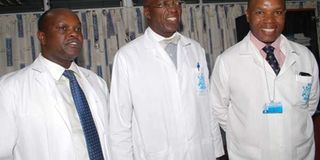The gifted hands that saved baby Satrine’s life

From left: Doctors Peter Mwangi, Chris Musau and Julius Kiboi at the Kenyatta National Hospital. PHOTO | DENISH OCHIENG
What you need to know:
- Thanks to a team of specialists at the Kenyatta National Hospital, Satrine Osinya tottered away from hospital with only a slight scar at the top of his head
- Dr Peter Mwangi was assisted by doctors Julius Kiboi, Samuel Njiri, Mohan Nilesh and Musau
The success of the delicate surgery to remove a bullet lodged in the head of one-year-old Satrine Osinya must have melted even the hardest of hearts.
Thanks to a team of specialists at the Kenyatta National Hospital, the toddler tottered away from hospital with only a slight scar at the top of his head.
Dr Peter Mwangi, the lead neurosurgeon in the operation, must have captured the attention of many when he showed the bullet they removed from the boy’s head. (READ: Now baby Satrine leaves hospital)
Mr Mwangi, who is head of neurosurgery at KNH, however, refuses to take full credit for saving Satrine’s life. The toddler was shot March 23 in a terrorist attack at Joy in Jesus Church in Mombasa.
He says the operation was made possible by a team of neurosurgeons and experts who went to the operating table fully aware of the responsibility that was on their shoulders.
Dr Mwangi says a lot of training and mentorship has gone into making who he is today. He has been practising neurosurgery at KNH since 2004.
“I completed my undergraduate degree course in 1993 and proceeded for internship in Nyeri. Later I moved to Nyahururu and then to Ol-Kalou. I did my post-graduate training in 1996 in MMed general surgery under Dr Chris Musau who was my supervisor at UoN,” he told the Sunday Nation. In 2001, he started specialising in neurosurgery. “I went for training, started working and I became better every day; I went in as a general surgeon and came out as a neurosurgeon.”
He credits his success to his mentors Prof Nimrod Mwang’ombe, Prof V.S.M. Mehta from New Delhi and Dr Musau, his teacher, colleague and senior neurosurgeon at KNH.
Dr Mwangi was assisted by doctors Julius Kiboi, Samuel Njiri, Mohan Nilesh and Musau.
Dr Kiboi, who has over 10 years’ experience in neurosurgery, was the “navigator” during the operation. His work was to guide Dr Mwangi during the delicate operation.
“I joined medical school in 1985. We did anatomy and brain dissection during my first year at medical school and I found it interesting. I joined KNH in 2001.”
“Surgery is a long journey, it is an art, it is a meticulous operation.
“In the past, neurosurgery was very rough and very bloody. People never used microscopes and sophisticated instruments. It was like butchery.
“Speaking of the fineness of the procedure currently, we did not even transfuse blood on baby Satrine, bleeding was minimal,” said Dr Kiboi.
“We planned the operation well and took care of all the risks. It was teamwork and we encourage our young doctors to work as a team. Share responsibility, spread the risk.”
TRAINED FIRST NEUROSURGEONS
Dr Musau, who is one of the longest-serving neurosurgeons in the country, was the patron of baby Satrine’s operation.
He has watched neurosurgery grow in the country and is credited with having trained the first batch of neurosurgeons at the University of Nairobi where he still lectures.
Dr Musau says that neurosurgical training has to be in-depth because the procedures involved are life-threatening. “I call it meticulous attention to detail.”
He says that through the cooperation of the University of Nairobi, Kenyatta and the neurosurgical fraternity, they hope to further develop neurosurgery in Kenya.
“We hope to develop an ultra-modern laboratory at Kenyatta Hospital to equip the neurosurgeons who recently qualified or those who are still under training with high level surgical skills,” said Dr Musau.
KNH has 12 neurosurgeons and Dr Musau looks forward to a time when there will be a neurosurgeon in every county. He encourages young people to pursue the course.
He says he has taken part in countless surgeries, but the most complex procedures he has ever carried out was to clip an aneurysm (swelling) at the centre of a patient’s brain in 2012.
The doctors state that brain surgery is not an easy course; it requires patience, determination, commitment, focus and discipline.
“At times we can be on our feet for more than 10 hours and therefore one should be very alert,” said Dr Musau.
“Neurosurgery involves operation of the brain, spine and brain tumours,” said Dr Kiboi.
Satrine was the first infant on which Dr Mwangi has carried out a brain operation, and he is confident he will recover fully. (READ: Bullet in the brain: Baby Satrine Osinya’s remarkable recovery)
“The area where the bullet was sitting is referred to as the occipital wall (silent area of the brain) and we were concerned that the baby could develop epilepsy but this may not occur. We will however follow up on his case,” said Dr Kiboi.
Dr Mwangi also credits anaesthetist Dr George Njogu, nurses, theatre support staff and biomedical team for the successful operation.




